#language learning resource
Explore tagged Tumblr posts
Text
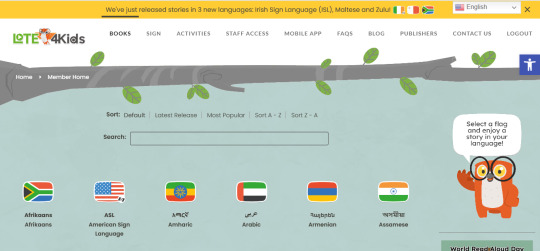
A beginner-level resource I just learned about is LOTE4Kids: online bilingual picture books. My library sent out an email about it recently. If your library is a member you can search for their name or enter the LOTE4Kids site through your library's site. Simplified Chinese has four levels: 1 (40-90 words), 2 (90-220 words), 3 (220-540 words), and 4+ (540-1200+ words). There's currently 80 available languages. There's no ads on the web version but I don't know about the app. There's more than 100 books in Mandarin. You can take a quiz at the end of the book if you like. You can listen in your target language, or English, or both. I found the English voice actor really annoying but that's a small price to pay, I think.
#language learning resource#free language learning resource#bilingual children's books#bilingual picture books#lote4kids
7 notes
·
View notes
Text
Language Learning Resource! (Video)
I feel like this video is a PERFECT outline of what you should be actively doing to learn another language.
—
youtube
—
Here’s the main takeaways with some of my own ideas thrown in:
1. Don’t learn a language with the intent to enjoy fun things in your target language LATER after you gotten to whatever your target level of fluency is: Just go ahead and start now! Watch the TV show you want to watch even if you don’t understand any of it yet, you’ll get there eventually.
2. You do not need to be speaking all the time with others to get good at speaking. It helps, but it should not be solely relied on. OP gives a good example of what he did wrong in the video.
3. Speaking a language isn’t due to knowledge like learning math is, it’s more like a muscle that is always working for the sake of function.
4. You can’t just do 30 minutes days and expect to be fluent eventually. You need to be using your target language as much as possible (aka immerse yourself). Immersion takes much more than 30 specific minutes out of your day. I actually do this all the time, talk to yourself in your target language, read your target language (I follow a lot of social media accounts in my target language so I constantly see it), text others in your target language, watch videos/movies, voice shadowing etc etc. You may even be able to feel when your brain is in (insert language here) mode. Me personally I can tell, and I notice that if I’m in Japanese mode it’s hard to absorb things in Mandarin or other language
5. Mindset is everything. If you think constantly about how hard something is, you will always feel like the task is hard. If you are learning a notoriously hard language, and ruminate about this, it will only hurt you in the long run. When I started learning Mandarin as a kid no one ever told me it was hard before, and I picked it up fast, and I only slowed down when I got frustrated about how hard the language is but sped back up when I reminded myself that input and immersion will get me the results I’m looking for eventually no matter which language.
—
#langblr#studyblr#language learning material#language learning resources#language lover#language learning#language study#language stuff#learning reference#learning resources#language lessons#language learning resource
45 notes
·
View notes
Text
Duolingo Sucks, Now What?: A Guide
Now that the quality of Duolingo has fallen (even more) due to AI and people are more willing to make the jump here are just some alternative apps and what languages they have:
"I just want an identical experience to DL"
Busuu (Languages: Spanish, Japanese, French, English, German, Dutch, Italian, Portuguese, Chinese, Polish, Turkish, Russian, Arabic, Korean)
"I want a good audio-based app"
Language Transfer (Languages: French, Swahili, Italian, Greek, German, Turkish, Arabic, Spanish, English for Spanish Speakers)
"I want a good audio-based app and money's no object"
Pimsleur (Literally so many languages)
Glossika (Also a lot of languages, but minority languages are free)
*anecdote: I borrowed my brother's Japanese Pimsleur CD as a kid and I still remember how to say the weather is nice over a decade later. You can find the CDs at libraries and "other" places I'm sure.
"I have a pretty neat library card"
Mango (Languages: So many and the endangered/Indigenous courses are free even if you don't have a library that has a partnership with Mango)
Transparent Language: (Languages: THE MOST! Also the one that has the widest variety of African languages! Perhaps the most diverse in ESL and learning a foreign language not in English)
"I want SRS flashcards and have an android"
AnkiDroid: (Theoretically all languages, pre-made decks can be found easily)
"I want SRS flashcards and I have an iphone"
AnkiApp: It's almost as good as AnkiDroid and free compared to the official Anki app for iphone
"I don't mind ads and just want to learn Korean"
lingory
"I want an app made for Mandarin that's BETTER than DL and has multiple languages to learn Mandarin in"
ChineseSkill (You can use their older version of the course for free)
"I don't like any of these apps you mentioned already, give me one more"
Bunpo: (Languages: Japanese, Spanish, French, German, Korean, and Mandarin)
#EDIT: Added a great resource for ESL and African languages that weren't found elsewhere#I do NOT recommend memrise and will talk about it another day but#langblr#duolingo#duo#language learning#language learning apps#mandarinblr#resource#reference
86K notes
·
View notes
Text
i cannot keep quiet about this anymore.
if you're seeing this, check the reblogs or my "languages" tag for an addition!!
if you're in the US or Canada and interested in learning a language using a free app please get a library card and download MANGO. it's very good and extremely free with a library card (there are many public libraries and universities using the service, so make an account and use the search feature here to find out if there's one near you).
mango currently has 72 available languages and dialects (that's right! different courses for french or canadian french! spanish or latam spanish!). it's set up basically like an audiobook with text. the idea is that the narrator explains the words while you read, and you repeat after them or say the translation out loud when prompted. there's a daily review where you go through flashcards. you can also use the flashcards at your leisure and create your own. at the end of each chapter there's a listening comprehension quiz and a reading comprehension quiz. i cannot emphasize how effective this all is. and it's free with a card.
if you're not in the US or Canada and/or looking for something more like duolingo (don't use duolingo btw tldr they fired translators and replaced them with "ai"), then try BUSUU! it only has 14 languages atm but the lessons are really descriptive and effective. it also has a feature where you can correct other people's open-ended speaking/typing exercises. you set your fluent languages, and exercises by people learning those languages will appear in your feed for you to correct. you can even add others as friends! and, much like duolingo, it has a streak and leaderboard system for you to strive for, minus the guilt-tripping owl.
busuu is free (you watch ads to unlock lessons and they're all skippable after like five seconds), although it also has paid premium/plus versions (i don't use the paid version—the language courses are available for free, and the ad system is Really unobtrusive).
so that's my wisdom for the day. mango and busuu. please check them out :)
#languages#language learning#mango languages#busuu#duolingo#<- in case people are using this tag to search for alternatives#this feels like a sponsor thing. it's not. i'm just autistic about language resources#i had to make a post about this bc my family and friends are tired of hearing about it LOL#orion originals
15K notes
·
View notes
Text
In light of Duolingo laying off its translators, here are my favourite language apps (primarily for Mandarin Chinese, Japanese, and te reo Māori).
Multiple Languages
Anki is a flashcard programme and app that's not exclusively for languages. While making your own decks is ideal, you can also download shared decks for most languages.
If you're learning Japanese, specifically, Seth Clydesdale has websites for practicing alongside Genki's 2nd or 3rd editions, and he also provides his own shared Anki decks for Genki.
And if you're learning te reo Māori, specifically, here's a guide on how to make your own deck.
TOFU Learn is an app for learning vocabulary that's very similar to Anki. However, it has particularly excellent shared decks for East Asian languages. I've used it extensively for practicing 汉字. Additionally, if you're learning te reo Māori, there's a shared deck of vocabulary from Māori Made Easy!
Mandarin Chinese
Hello Chinese is a fantastic app for people at the HSK 1-4 levels. While there's a paid version, the only thing paying unlocks is access to podcast lessons, which imo are not really necessary. Without paying you still have access to all the gamified lessons which are laid out much like Duolingo's lessons. However, unlike Duolingo, Hello Chinese actually teaches grammar directly, properly teaches 汉字, and includes native audio practice.
Japanese
Renshuu is a website and app for learning and practicing Japanese. The vast majority of its content is available for free. There's also a Discord community where you can practice alongside others.
Kanji Dojo is a free and open source app for learning and practicing the stroke order of kanji. You can learn progressively by JLPT level or by Japanese grades. There's also the option to learn and practice kana stroke order as well.
12K notes
·
View notes
Text
my friend and i were going to study a language together and wound up having to cancel our plans due to scheduling pressures, but! through research we came across a really cool resource for reading in a TON of languages: bloom library!
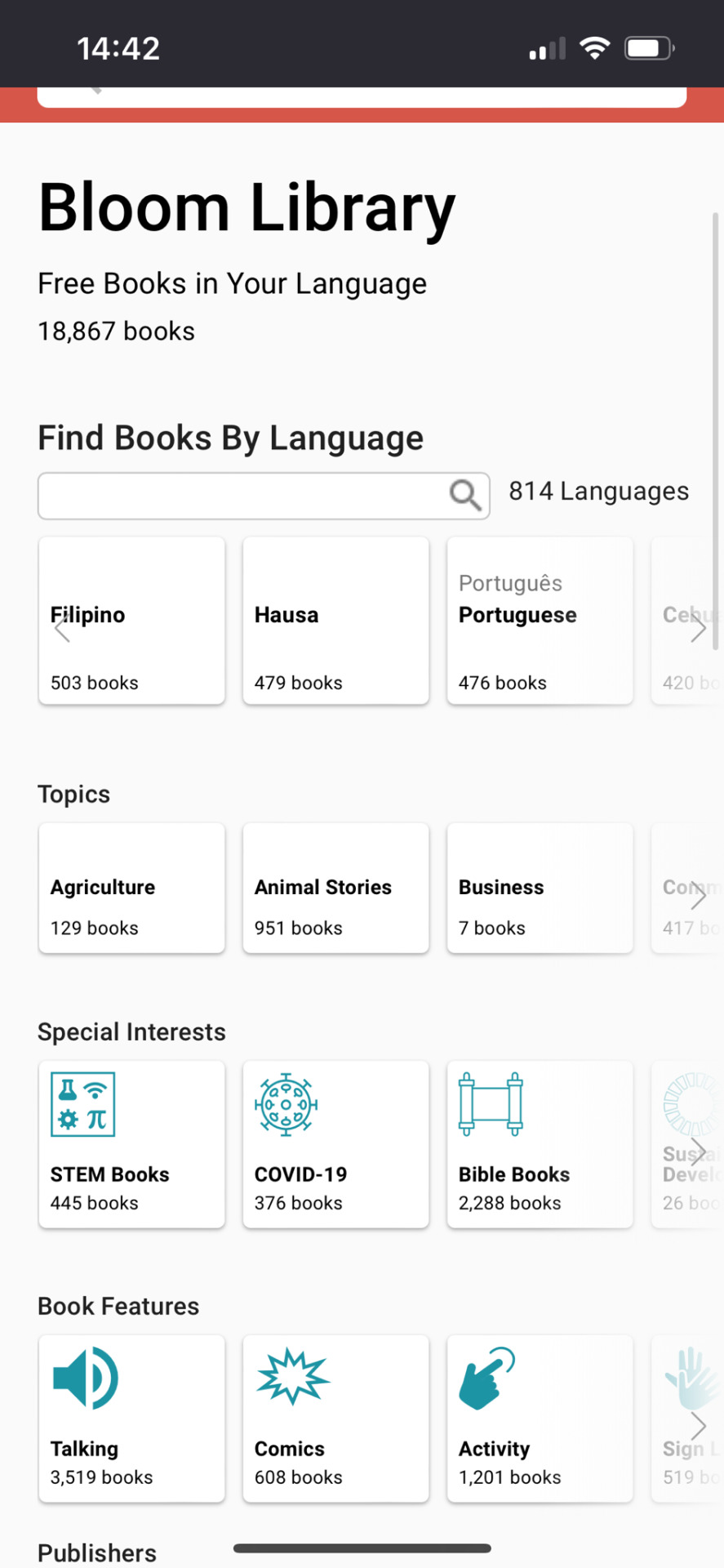
as you can see, it has a lot of books for languages that are usually a bit harder to find materials for—we were going to use it for kyrgyz, for example, which has over 1000 books, which was really hard to find textbook materials for otherwise. as you can see it also has books with audio options, which would be really useful for pronunciation checking. as far as i can tell, everything on the site is free as well.
7K notes
·
View notes
Text
Novice sewing pattern: Cut out shapes. Line up the little triangles on the edges. Stitch edges together. We've also included step-by-step assembly instructions with illustrations.
Novice knitting pattern: yOU MUSt uNDerstANd thE SECret cOdE CO67 (73, 87, 93) BO44 (63, 76, 90) 28 (32, 34) slip first pw repeat 7x K to end *kl (pl) 42 * until 13" (13, 13, 15) join new at 30 pl for 17 rows ssk 27 k2tog mattress lengthwise BO and sacrifice a goat to the knitting gods. WHAT DO YOU MEAN YOU WANT "INSTRUCTIONS," I JUST GAVE THEM TO YOU
#knitting#no it's not a real pattern but I can't write one that makes sense because I have no freaking clue what any of that means#How do you make things that aren't basic rectangles#Why has every knitter I've asked for help just said 'patterns are easy; you just have to know how to read them' & then refused to teach me#Where do I even find a goat to sacrifice#How do I join the pattern cult#I am so confused#I've been knitting for almost a decade but I can only make scarves and potholders#I learned one (1) stitch by watching a YouTube video and none of my friends or family knit so I have no IRL resources#And nobody I meet seems to want to take the time to explain the rest to me#I taught myself to sew through trial and error but that doesn't really work with knitting because error is pretty much just... Unraveling?#Anyway sorry for the tag rant I'm just frustrated that I see pretty things I want to make but the instructions are in an alien language#And the gap between 'absolute novice' and 'intermediate' seems to be about 20 years of experience and formal instruction
2K notes
·
View notes
Text
Found a new language practice app!
Polygloss has you describe an image in your target language so another player can guess it. It encourages creative answers. The game works for people of all levels — you can describe simple pictures or try your hand at wordplay.

It has plenty of options and will let you add any language you’d like — tho it’ll probably be more difficult to find people to play with.
#language learning tips#Quinn posts#language resources#Japanese resources#Spanish resources#language#langblr#language learning#100#500#1k
1K notes
·
View notes
Text







MY FAV FRENCH RESOURCES 🇫🇷💌
this my recent post on my studygram and I wanted to post it on here 🧸
follow my studygram for more: @stepstofluency
#studyblr#langblr#language learning#buse#studygram#learning languages#study#languages#study inspo#study space#learning french#french#learn french#french language#french langblr#language resources#french resources
807 notes
·
View notes
Text
Don't Use Duolingo if You Really Want to Learn Irish
That title is a bit dramatic, but I really don't think that duolingo is a useful tool for Irish, especially in its current state, so I want to talk a bit about why, and I'll also talk about some alternatives.
Pronunciation
The first and most egregious issue is that at some point recently-ish, duo decided to start using Text-To-Speech for their Irish course, rather than recordings of a native speaker. The problem here is that their TTS is not trained on native speakers of Irish and pronounces words incorrectly. It doesn't make consistent distinctions between broad and slender consonants for example.
Irish has no standard pronunciation, so I understand how it can feel weird to choose just one dialect for the purposes of pronunciation (the old recordings were from a speaker of Galway Irish), but having just one dialect is much better than TTS which sounds like a learner, imagine if they had TTS for the French course which sounded like an anglophone schoolkid trying to pronounce french, and claimed they were teaching you how to speak french!
Grammar
Duo tends to be correct on grammar at least, which is a start. But often people using it get very confused about the grammar because duo doesn't explain any of it. I think there's a place for immersion in language learning, and I don't think everything has to be explained like that, but within duo's system of sentence testing and exercises like that, not having any explanation for why it's "mo chóta" and not "mo cóta" can be really confusing. Duo used to have more grammar information, it's a shame that they removed it, I wonder why they did it.
Money and Motivation
Duolingo is a business, and their motivation is not to help you learn a language 'fully', but to keep you using their app and hopefully have a higher chance of sharing it with others, competing with others, buying or causing others to buy memberships or lingots or any other in-app purchases.
I don't want to make it out like duo is some big conspiracy and they're tricking people, I don't think that's the case, but it's good to remember that their primary motivation is to keep people using the app, rather than help people move to a level in a language where they don't need the app anymore.
Keep this in mind whenever you see people trying to sell you stuff for language learning.
Why do people use Duolingo
I do get it, and I don't want to make anyone feel bad for using duo, there's a ton of reasons people tend towards it at first 1. It's really well known, so especially if you're learning a language and haven't heard of other resources for it, you'll check duolingo 2. It's very motivating for a lot of people, checking in every day and forming that habit is a really good way of sticking with a language 3. It's fun, people enjoy it
If you use it for reason 3. and you still like it, then don't worry about this post, I'm not trying to yuck anyone's yums, keep having fun!
If you use it for reasons 1. or 2. you can still keep using it if you like, but I want to suggest some other things which you might find helpful in trying to get to a higher level in Irish.
Other Resources
To address the pronunciation issue, I'd heavily recommend you disregard the pronunciation in duolingo, if you're looking for more reliable sources of pronunciation, I'd look towards recordings of native speakers, you can find that on:
Teanglann and Foclóir (they use the same recordings)
Fuaimeanna
and a really useful and underused one: https://davissandefur.github.io/minimal-pairs/ where you can hear the difference between similar sounds that English speakers often mix up in Irish.
A lot of people like duolingo because it's nice to have a clear path forward, a progression that you can get into without too much decision-making. For this I recommend getting a good textbook or course and working through it, the ones I'll recommend also have native speaker audio on them.
Learning Irish by Mícheál Ó Siadhail, this book teaches Galway Irish, not just in pronunciation but in grammar too. It's quite dense but it's well thought out and well explained.
Teach Yourself Irish (1961) this book is available for free online, and is a really good option if you're interested in Cork Irish (Munster), and have some experience with grammatical terminology. I used this book myself and really liked it, but it's very intense and not for everyone. (If you do end up using it, feel free to skip the appendices at the start, they're more of a reference and sometimes put people off from actually getting to the first chapter. Also if you have any questions about it or need any help just let me know.)
If you want a video course, there's a great course called "Now You're Talking" which is available for free online, along with audio files and worksheets here. It features Donegal Irish and leads into the more intermediate level course called Céim ar Aghaidh also available online.
There's other textbooks that I have less experience with (Buntús na Gaeilge, Gaeilge/Gramadach Gan Stró, etc.) but if they work for you, stick with them, there's nothing worse than not making progress because you keep switching resources trying to find the "perfect one"
Whether or not you continue to use Duolingo, I would really really encourage you to try engaging with media in Irish. People often shy away from this when they're learning because they don't feel like they're "ready" yet. But you basically never feel like you're ready, you just have to try and find something near your level and try to get comfortable with not understanding everything. This is where you learn a huge portion of the language, you hear how things are pronounced you see what words mean in what contexts, getting input in your target language is so important!
I know content can be kind of hard to find, so I'll make a few recommendations here: There's a wealth of content available for free online (more if you're in ireland but some internationally) on TG4 If you're still starting out, I'd recommend trying to watch some kids shows since they'll have simpler language and will be easier to follow. I wouldn't recommend using English subtitles when you watch them. Some good options include:
Dónall Dána: an Irish dub of Horrid Henry, silly and childish but the actors have good Irish and importantly the show has Irish language subtitles, they don't always match but if you're still beginning and can't necessarily get everything by ear, they're really useful. (Mostly Galway Irish)
Curious George: another dub, again with Irish language subtitles (I can't remember what dialects were in it off the top of my head but I'd assume mostly galway again)
Seó Luna: No subtitles, but a good option if you're aiming for Munster Irish, the lead character has Kerry Irish
Miraculous: No subtitles but a better show than most of the other kids' ones and more bearable to watch as an adult (Mostly Galway Irish)
Ros na Rún: Moving away from kids shows, a long running soap opera, this has Irish subtitles and a really good mix of dialects within the show. If you're finding the kids shows boring or too easy I'd really recommend it, but it can be complex because of the amount of characters, dialects, and plotlines. I'd recommend starting at the beginning of a newer season and just trying to catch on to what's happening as you go.
There are a lot of books, if you live in Ireland you can get nearly any Irish book for free from a library, so please check out your local library or request some of these from other libraries in the system:
There's a series of fairytales (Rápúnzell, Luaithríona etc.) by Máiréad Ní Ghráda which are illustrated and for children, which are a really good option for when you're just starting out reading
There's kids books about Fionn and the Fianna by Tadhg Mac Dhonnagáin
There's a cute little kids' book in Kerry Irish about a cat named Mábúis
Leabhar Breac has a lot of graphic novels, some of them based on Irish mythology, some on other stuff. The fact that they're illustrated can make it a lot easier to follow even if you don't understand all the words at first.
Gliadar has just released their Scott Pilgrim translation
If you're looking for something a bit more advanced you can look at some of the books for adult learners by Comhar, they contain simplified language and glossaries but have full original adult stories.
And if you're wanting full, natural, native-level Irish there's a load of books by those same groups, and others like An Gúm, Cló Iar-Chonnacht, Oidhreacht Chorca Dhuibhne, Éabhlóid, Coiscéim, and more.
And don't shy away from older books written in Seanchló either, they can be more challenging but it's a whole extra world of books
If you're trying to improve your listening comprehension, I definitely recommend listening to shows on Raidió na Gaeltachta, hearing native Irish speakers talk at full speed is really good practice. But I get that it can be overwhelming at first. Here are some things you can do as you build up to that:
Watching those same TV shows I mentioned without subtitles is a good way to build up listening skills.
Vifax is a website where you can practice listening to short news segments and answer questions on them, then getting to look at the transcript with notes afterwards.
Snas is kind of the evolution of vifax, now using clips from both the news and Ros na Rún.
I really hope that this post can help people move away from duolingo if they're looking to take their Irish learning to the next level, if you've got any questions, just let me know!
3K notes
·
View notes
Text
Huge news for people interested in similar things to this blog, the Say Something In Welsh team is launching an Irish language course! Resources, especially listening resources have been quite hard to find in Irish, I know way more people that can read and write in Irish than speak it with any confidence at all, and the Say Something method gave me so much more confidence in my own Welsh speaking, I imagine then coming into the Irish language teaching space is a really good thing.
Their founder Aran Jones says they've been in talks with the Irish government for 'copromotion', and while I'm not fully sure what that entails, it must be a road to having more and more widely available, quality learning resources for Gaeilge.
Since this blog is followed not just by Welsh learners, but a lot of people generally interested in language learning and Celtic studies, thought I'd mention it here! Dyn ni'n dod nôl i feddwl yn Gymraeg yn fuan, dwi'n siwr :)
#language learning#resources#welsh#Irish#language resources#linguistics#language#celtic languages#ireland#Gaeilge#languages#Welsh#Cymru#cymraeg#langblr resources#I'm excited about it. I'll probably give it a shot#Say something in Welsh
315 notes
·
View notes
Text
#my polls#random polls#tumblr polls#poll time#poll game#polls#programming poll#coding poll#coding#programming#just wanted to see how many other people know how to code#if anyone sees this and has resources for people to learn code#please link it#thanks <3#java is the best language though
1K notes
·
View notes
Text
How to Practice Chinese Characters Without Paper for iOS
⎯⎯⎯⎯⎯⎯⎯⎯⎯⎯⎯⎯⎯⎯⎯⎯⎯⎯⎯⎯⎯⎯
It’s time for another small tutorial!
Whether you have hand troubles or never have paper on you, you can still practice Chinese writing on your phone. All you need is your thumb!
Simply go to your settings, select ‘general’ then ‘keyboard’ and select Simplified or Traditional Chinese (or both) and under each there should be an option for ‘writing’. Once it’s downloaded you can open it wherever you can type.
This function is really helpful when you see a Chinese character that you don’t know or remember the pronunciation for, so you can write it and input it into an online dictionary or Pleco.
This method will work for most Chinese characters so it can be used for Japanese Kanji as well. However, there are some Japanese Kanji that do not appear in Mandarin, thus are only sometimes detected by this keyboard. Rare Chinese Characters may or may not be picked up as well.

My handwriting is messy, but as you can see you can fit about 3 characters onto it.
If you’re a newer learner, I suggest you learn stroke order because it will help your handwriting a lot and make it easier to detect on these keyboards. The iOS keyboard is very good so it detected my messy handwriting correctly. However, other keyboards such as Pleco and MDBG may not be as flexible.
The downside (or upside?) is the characters you wrote disappear a few seconds after writing them, however the text character suggestions above do not unless you delete them. To me, this is an upside because it challenges your brain to remember the character faster and more efficiently as your brain prepares to rewrite what you lost.
⎯⎯⎯⎯⎯⎯⎯⎯⎯⎯⎯⎯⎯⎯⎯⎯⎯⎯⎯⎯⎯⎯
Please correct me if I made a mistake.
Buy me a coffee
#chinese to english#chinese#language learning material#language learning resource#chinese language#chinese langblr#chinese lesson#traditional chinese#study chinese#learn chinese
1 note
·
View note
Text
Language Apps Suck, Now What?: A Guide to Actually Becoming "Fluent"
The much requested sequel to my DL post that was promised almost a year ago.
I'm going to address all of the techniques that have helped me in my language learning journeys. Since 95% of these came from the fact that in a past language learning mistake, they are titled as my mistakes (and how I would/did things differently going forward). For those that read to the bottom there is a "best universal resources" list.
Disclaimers:
"Fluency" is hard to define and everyone has their own goals. So for the purpose of this post, "fluency" will be defined as "your personal mastery target of the language".
If you just want to pick up a bit of a language to not sound like a total foreigner on vacation or just exchange a few words in a friend's native language, feel free to ignore what doesn't apply, but maybe something here could help make it a little easier.
This is based on my own personal experience and (some) research.
Mistake 1: Asymmetrical Studying
Assuming you don't just want to do a single activity in a language, or are learning a language like ASL, a language requires 4 parts to be studied: Speaking, Listening, Writing, Reading. While these have overlap, you can't learn speaking from reading, or even learn speaking from just listening. One of my first Chinese teachers told me how he would listen to the textbook dialogues while he was biking to classes and it helped him. I took this information, thought "Yeah that's an idea, but sounds boring" and now regret not taking his advice nearly every day.
I think a lot of us find methods we enjoy to study (mine was reading) and assume that if we just do that method more ™ it will eventually help us in other areas (sometimes it does, but that's only sometimes). Find a method that works for you for each area of study, even better find more than one method since we use these skills in a variety of manners! I can understand a TV program pretty well since I have a lot of context clues and body language to fill in any gaps of understanding, but taking a phone call is much harder—the audio is rougher, there's no body language to read, and since most Chinese programs have hard coded subtitles, no subtitles to fall back on either. If I were to compare the number of hours I spent reading in Chinese to (actively) training my listening? Probably a ratio of 100 to 1. When I started to learn Korean, the first thing I did was find a variety of listening resources for my level.
Fix: Find a variety of study methods that challenge all aspects of the language in different ways.
A variety of methods will help you develop a more well-rounded level of mastery, and probably help you keep from getting bored. Which is important because...
Mistake 2: Inconsistent Studying
If there is one positive to a language app, it is the pressure it puts on keeping a streak. Making studying a part of your everyday routine is the best thing you can do. I benefited a lot from taking a college language course since I had a dedicated time to study and practice Chinese 5 days out of the week (and homework usually filled the other two). Memorization is a huge part of language learning, and stopping and starting is terrible for memorization. When I was in elementary school, we had Spanish maybe a couple times a month. Looking back, it seems like it was the first class to be cut if we needed to catch up on a more important course. Needless to say, I can't even speak Spanish at an elementary level.
However, I'm sure many people reading this don't have the time to do ultra-immersion 4-hour study sessions every day either. Find what days during the week you have time to focus on learning new vocab and grammar, and use the rest of the week to review. This can be done on your commute to school/work, while you do the dishes, or as a part of your morning/evening routine. Making this as realistic as possible will help you actually succeed in making this a habit. (Check this out for how to set realistic study goals)
Fix: Study regularly (ideally daily) by setting realistic goals. Avoid "binge" studying since remembering requires consistent repetition to be most effective.
Mistake 3: Resource Choice
This is really composed of two mistakes, but I have a good example that will cover them both.
First, finding resources that are at or slightly above your level is the most important thing. Easy resources will not challenge you enough and difficult resources will overwhelm you. The ideal is n+1, with n as what you know plus 1 new thing.
Second, getting distracted by fancy, new technology. Newer isn't always better, and there are often advantages that are lost when we've made technological developments. I often found myself wanting to try out new browser extensions or organizational methods and honestly I would've benefitted from just using that time to study. (Also, you're probably reading this because of my DL post so I don't think it has to be said that AI resources suck.)
A good example of this was my time using Clozemaster. I had actually recommended it when I first started using it since I thought the foundation was really solid. However, after long term use, I found that it just wasn't a good fit. The sentences were often too simple or too long and strange for memorization at higher levels or were too difficult at lower levels. I think that taking my textbook's example sentences from dialogues into something like Anki would've been a far better use of my time (and money) as they were already designed to be at that n+1 level.
Fix: "Vet" your resources—make sure they will actually help you. If something is working for you, then keep using it! You don't always have to upgrade to the newest tool/method.
Mistake 3.5: Classrooms and Textbooks
A .5 since it's not my mistake, but an addendum of caution. I think there is a significant part of the language learning community that views textbooks and classroom learning as the worst possible resource. They are "boring", "outdated", and "ineffective" (ironically one of the most interesting modern language learning methods, ALG, is only done in a classroom setting). Classrooms and textbooks bring back memories of being surrounded by mostly uninterested classmates, minimal priority, and a focus on grades rather than personal achievement (imagine the difference between a class of middle schoolers who were forced to choose a foreign language vs. adult learners who self-selected!) People have used these exact methods, or even "cruder" methods, to successfully learn a language. It all comes down to what works best for you. I specifically recommend textbooks for learning grammar and the plentiful number of dialogues and written passages that can function great as graded readers and listening resources. (Also the distinction made between "a youtube lesson on a grammatical principle" which is totally cool, and "a passage in a grammar textbook" is more one of tone and audio/written than efficacy).
Classrooms can be really great for speaking practice since they can be a lot less intimidating speaking to someone who is also learning while receiving corrections. Speech can be awkward to train on your own (not impossible if you're good at just talking aloud to yourself!), and classrooms can work nicely for this. Homework and class schedules also have built in accountability!
Fix: Explore resources available to you and try to think holistically about your approach. CI+Traditional Methods is my go to "Learning Cocktail"
Mistake 4: Yes, Immersion, But...
I realized this relatively quickly while learning Chinese, but immersion at a level much higher than your current level will do very little for you. What is sometimes left out of those "Just watch anime to learn Japanese" discussions is that you first need to have a chance at understanding what is being said. Choosing materials that are much higher than your level will not teach you the language. It doesn't matter how many times someone at HSK 1 hears “他是甘露之惠,我并无此水可还”, they will not get very far. Actual deduction and learning comes from having enough familiar components to be able to make deductions—something different than guessing. An HSK 1 learner, never having heard the word 老虎 will be able to understand "tiger" if someone says “这是我的老虎” while standing next to a tiger. This is not to say you can never try something more difficult—things should be challenging—but if you can't make heads or tails of what's being said, then it's time to find something a bit easier. If mistake 2 is about the type of method, this is about the level. If you wouldn't give a kindergartener The Great Gatsby to learn how to read, why would you watch Full Metal Alchemist to start learning a language?
Side note: Interesting video here on the Comprehensible Input hypothesis and how it relates to neurodivergence.
Fix: Immerse yourself in appropriate content for your level. It's called comprehensible input for a reason.
Mistake 5: On Translation
I work as a translator, so do you really think I'm going to say translation is all bad? Of course not. It's a separate skill that can be added on to the basic skills, but is really only required if you are A. someone who is an intermediary between two languages (say you have to translate for a spouse or family member) or B. It is your job/hobby. In the context of sitting down and learning, it can be harmful. I think my brain often goes to translation too often because that's how I used to learn. Trying to unlearn that is difficult because, well, what do people even mean when they say "don't translate"? They mean when someone says "thank you", you should not go to your primary language and translate "you're welcome" from that. You should train yourself to go to your target language first when you hear the word for "thank you". A very literally translated "thank you" in Chinese "谢谢你" can come off as cold and sarcastic. I don't tell my friends that, I say "谢啦~". Direct translation can take away the difference in culture, grammar, and politeness in a language. If there is a reason you sound awkward while writing and speaking, it's probably because you're imposing your primary language on your target language.
Fix: Try as hard as you can to not work from your primary language into the target language, but to work from the structures, set phrases, and grammar within the target language that you know first.
Mistake 6: The Secret Language Learners Don't Want You To Know...
...is that there is no one easy method. You are not going to learn French while you sleep, or master Korean by doing this one easy trick. Learning a language requires work and dedication, the people that succeed are those that push through the boredom of repetition and failure. The "I learned X in 1 year/month/week/day!" crowd is hiding large asterisks, be it their actual level, the assistance and free time available to them, "well actually I had already studied this for 4 years", or just straight-up lying. Our own journeys in our native tongue were not easy, they required years and years of constant immersion and instruction. While we are now older and wiser people that can make quick connections, we are also burdened with things like "jobs", "house work", "school work", and the digital black hole that is "social media" that take up our time and energy. Everything above is to help make this journey a little bit easier, quicker, and painless, but it will never be magic.
I find that language learning has a lot in common with the fitness community. People will talk about the workout that changed their life and how no other one will do the same—and it really can be the truth that it changed their life and that they feel it is the ultimate way. The real workout that will change your life is the one you're most consistent with, that you enjoy the most. Language learning is just trying to find the brain exercise that you can be the most consistent with.
Fix: Save your energy looking for shortcuts, and do the work, fail, and come back for more. If someone tells you that you can become fluent in a ridiculously short amount of time, they are selling you a fantasy (and likely a product). You get out what you put in.
For those that made it to the end, here are some of my "universal resources":
Refold Method: I don't agree with their actual method 100%, but they've collected a lot of great resources for learning languages. I've found their Chinese and Korean discords to also be really helpful and provided even more resources than what's given in their starter guides.
Language Reactor: Very useful, and have recently added podcasts as a material! The free version is honestly all you need.
Anki: If I do not mention it, the people with 4+ year streaks with a 5K word deck will not let me forget it. It can be used on desktop or on your phone as an app. If you need a replacement for a language learning app, this is one of them. Justin Sung has a lot of great info on how to best utilize Anki (as does Refold). It's not my favorite, but it could be yours!
LingQ: "But I thought you said language apps are bad!" In isolation, yes. Sorry for the clickbait. This one is pretty good, and more interested in immersing you in the language than selling a subscription to allow you to freeze your streak so the number goes up.
Grammar Textbooks: For self-taught learning, these are going to be the best resource since it's focused on the hardest part of the language, and only that. If you're tired of seeing group work activities, look for a textbook that is just on grammar (Modern Mandarin Chinese Grammar is my rec for Chinese, and A Guide to Japanese Grammar by Tae Kim is the most common/enthusiastic rec I've heard for Japanese).
Shadowing: Simply repeat what you hear. Matt vs Japan talks about his setup here for optimized shadowing (which you can probably build for a lot cheaper now), but it can also just be you watching a video and pausing to repeat after each sentence or near simultaneously if you're able.
Youtube: Be it "Short Story for Beginners", "How to use X", "250 Essential Phrases", or a GRWM in your target language, Youtube is the best. Sometimes you have to dig to find what works for you, but I imagine there is something for everyone at every level. (Pro tip: People upload textbook audio dialogues often, you don't even have to buy the textbook to be able to learn from it!)
A Friend: Be it a fellow learner, or someone who has already mastered the language, it is easier when you have someone, not only to speak to, but to remind you why you're doing this. I write far more in Chinese because I have friends I can text in Chinese.
Pen and Paper: Study after study, writing on paper continues to be the best method for memorization. Typing or using a pen and tablet still can't compare to traditional methods.
The Replies (Probably): Lots of people were happy to give alternatives for specific languages in the replies of my DL post. The community here is pretty active, so if this post blows up at least 20% of what the last one did, you might be able to find some great stuff in the replies and reblogs.
I wish you all the best~
604 notes
·
View notes
Text

These are the apps and links I currently have on my phone to study Chinese:
SuperChinese: my main study resource. There are currently 7 levels, level 7 (still incomplete, they are still slowly adding lessons to it) being HSK 5 stuff. Each lesson has vocabulary, grammar and a short dialogue where those are used in context (I love context). It has a few free lessons in the lower levels but after that you have to buy a subscription. There are many sales though. When I was a beginner I used HelloChinese instead, which has more free content, and switched to SuperChinese when I finished all the free content there. It also has social network features and chat rooms I don't use.
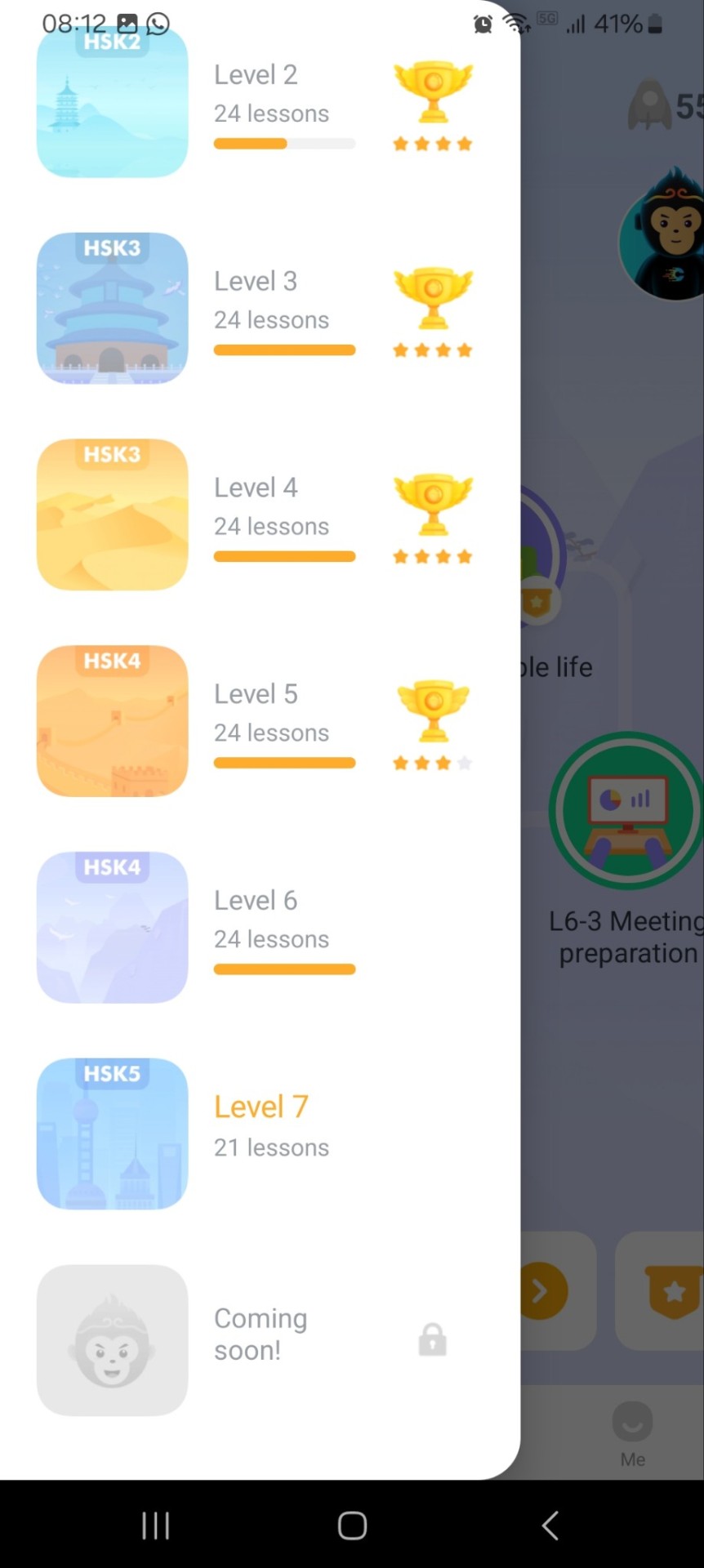
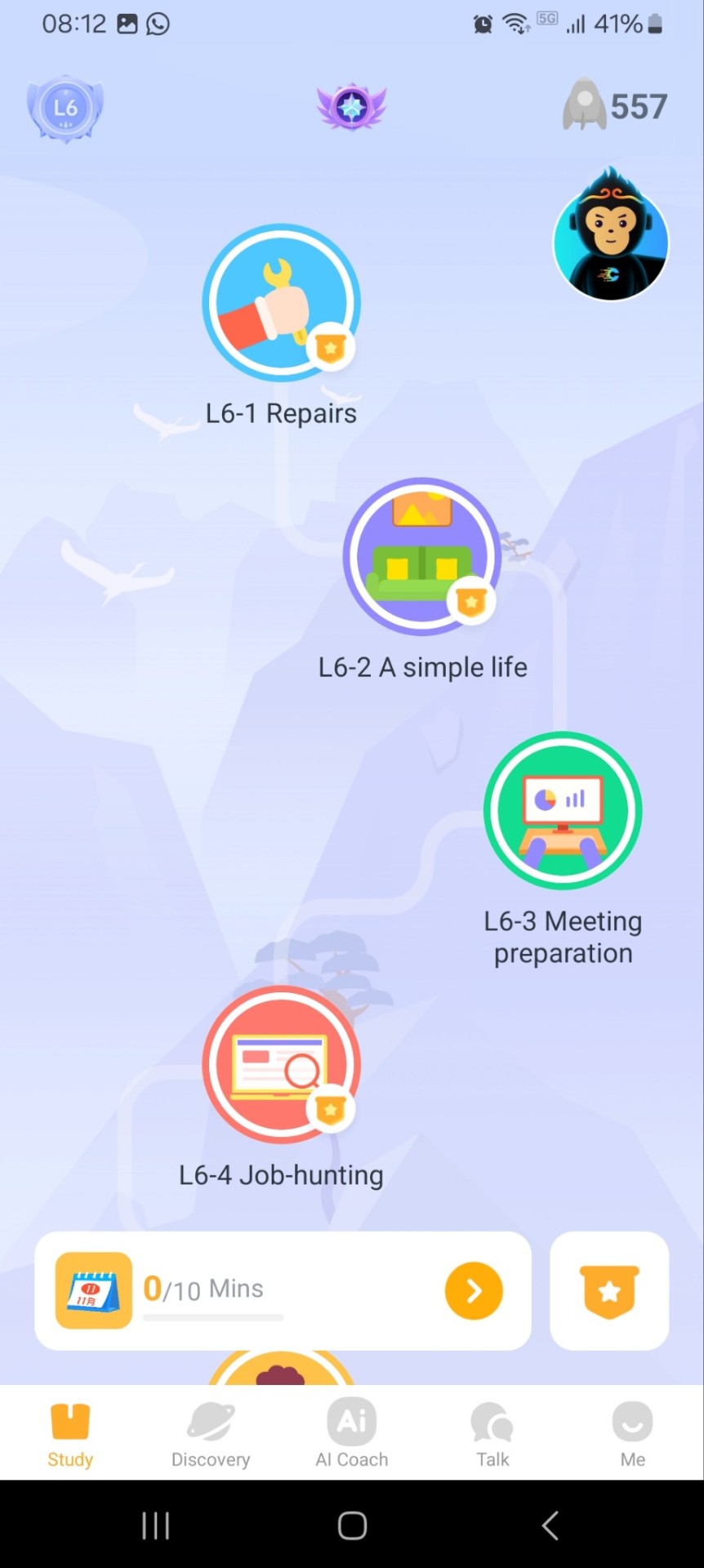
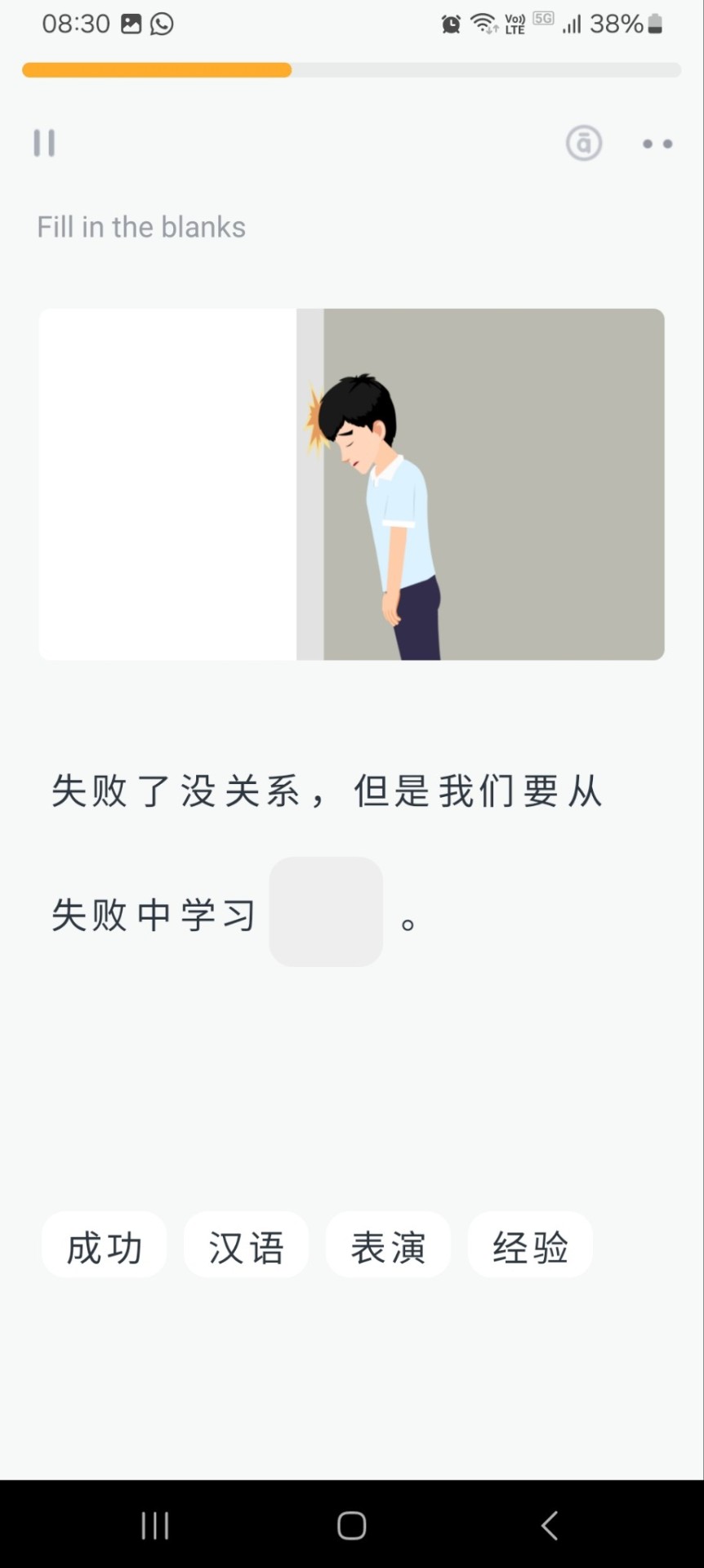

TofuLearn is like a flashcard app with many pre-made decks (you can also create your own on their website and import decks from Anki) and the option to practice writing hanzi. Anki didn't work for me, but I find Tofu very helpful. Practicing writing helps me with character recognition, and it also helps me remember the tones thanks to the audio in the pre-made HSK decks.
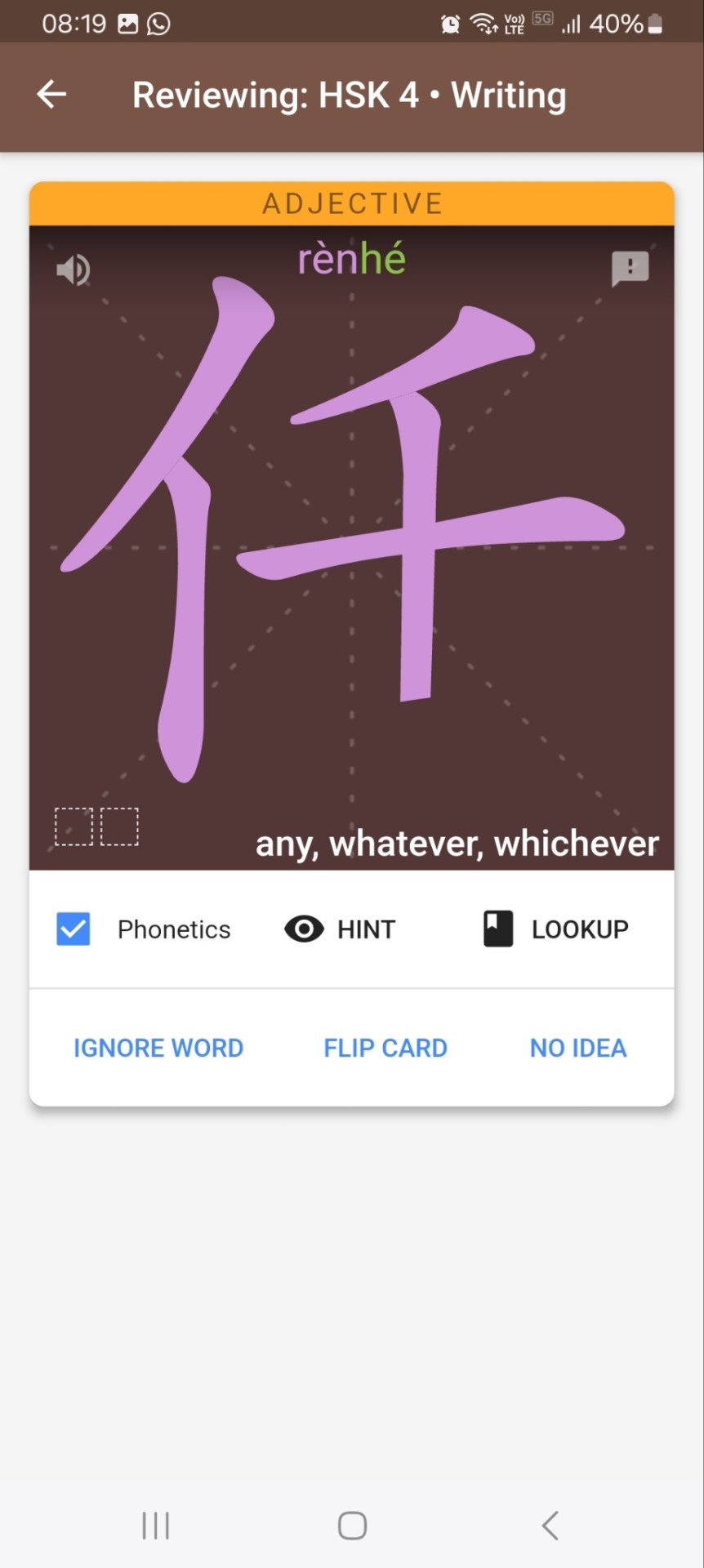
Dot is a reading app with new texts being added every day. It used to be completely free, which actually seemed too good to be true, and then they put practically everything behind a paywall and very strict limits for free users. After a couple of months they made it a little less restricted though - we still can't choose the articles but we can read as many as we want as long as we do the vocabulary exercises after each article (plus, during the Spring Festival, they made all articles available for free for 3 days and we could save the ones we were interested in to read later). It follows the new, not-yet-implemented (and harder) HSK levels, so you should start one or two levels below yours and if the texts are too easy move up.
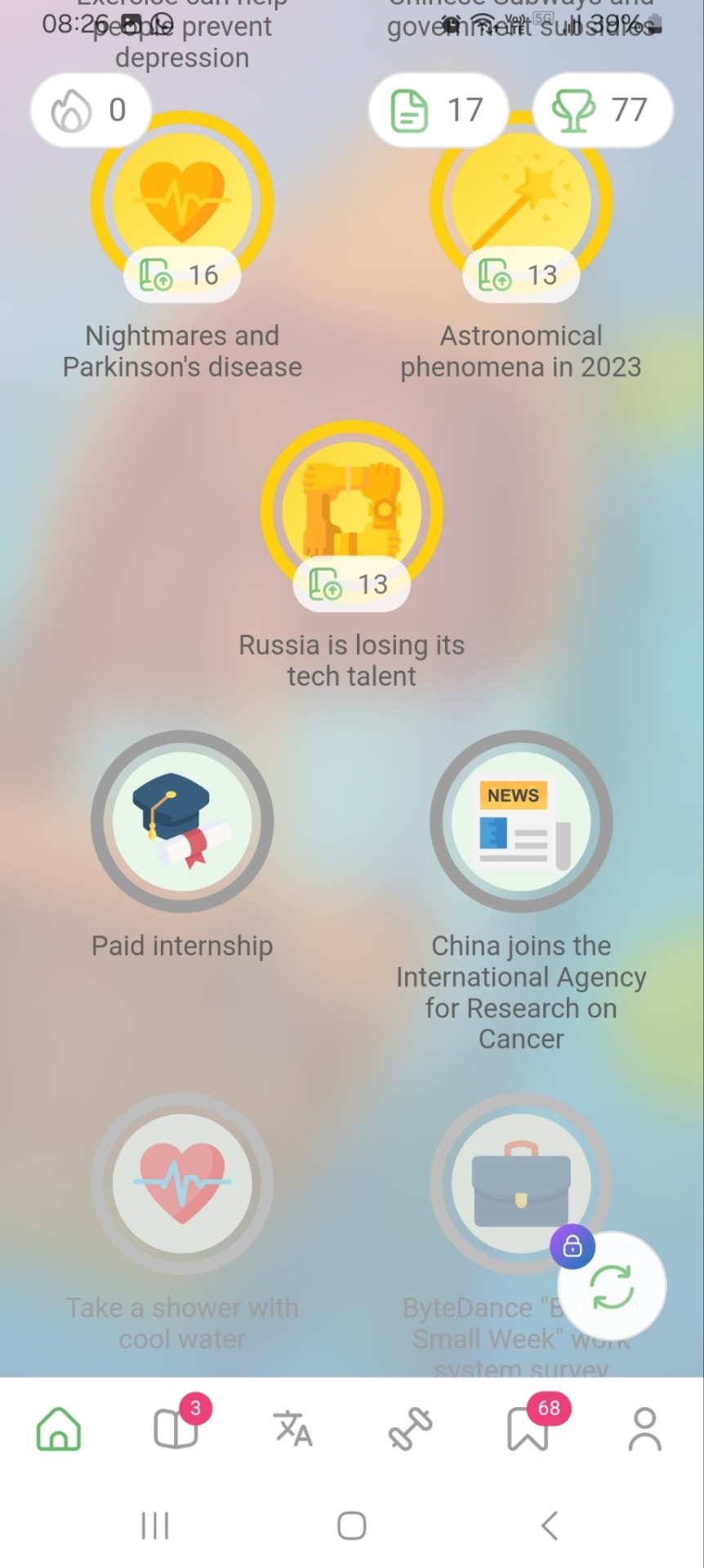
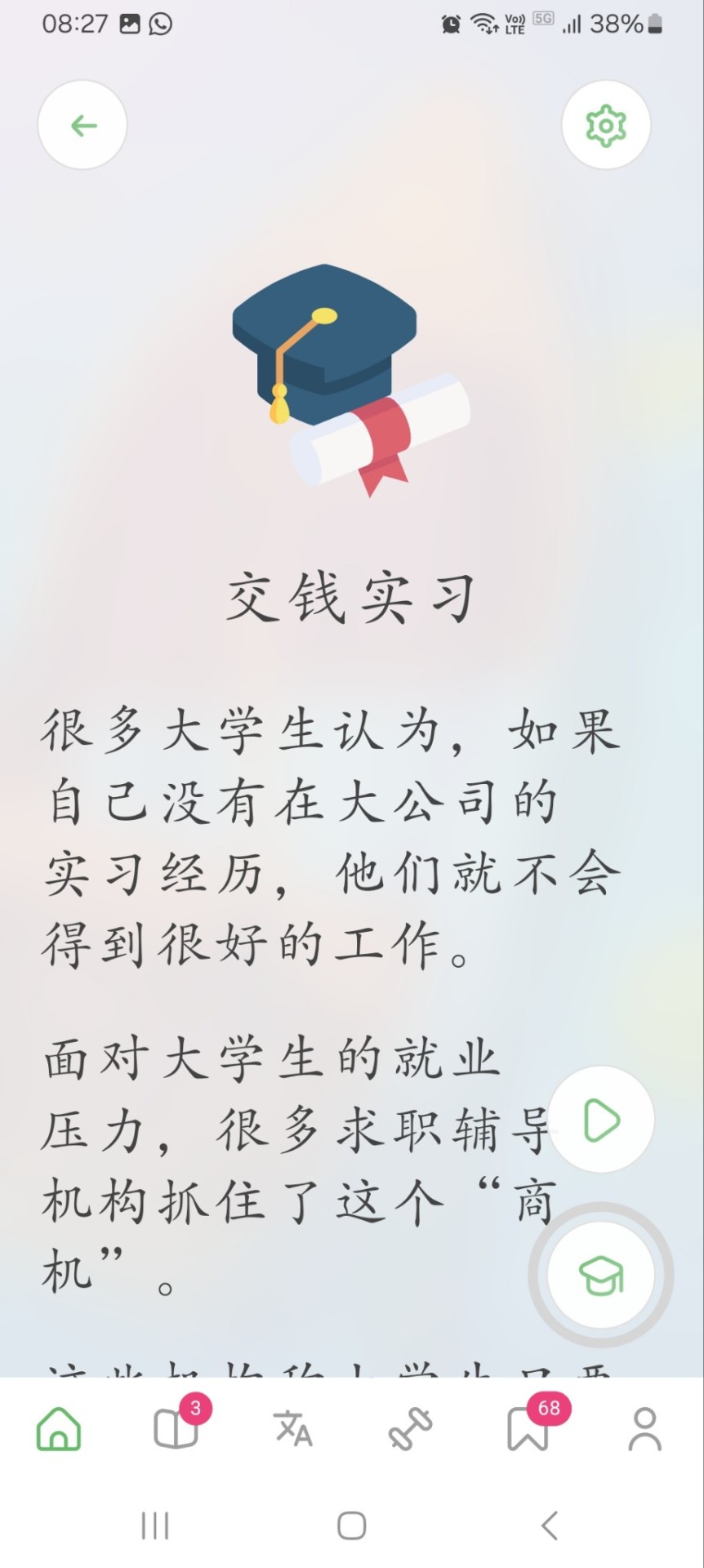
Google Translator: not the best but helpful when I need to translate whole sentences, plus I can point my camera or open an image and it translates writing.
Pleco: best Chinese to English dictionary.
Stroke Order: not an app but a website, does what it says in the tin: shows stroke order for a specific character.
YouGlish: also a website, you can put a word or phrase and it shows videos where people say that word/phrase. Very cool.
Todaii is a graded news app that has only two levels: easy and hard. I'm around level HSK4 and the "easy" level is quite hard though (but I admit reading is my nemesis).
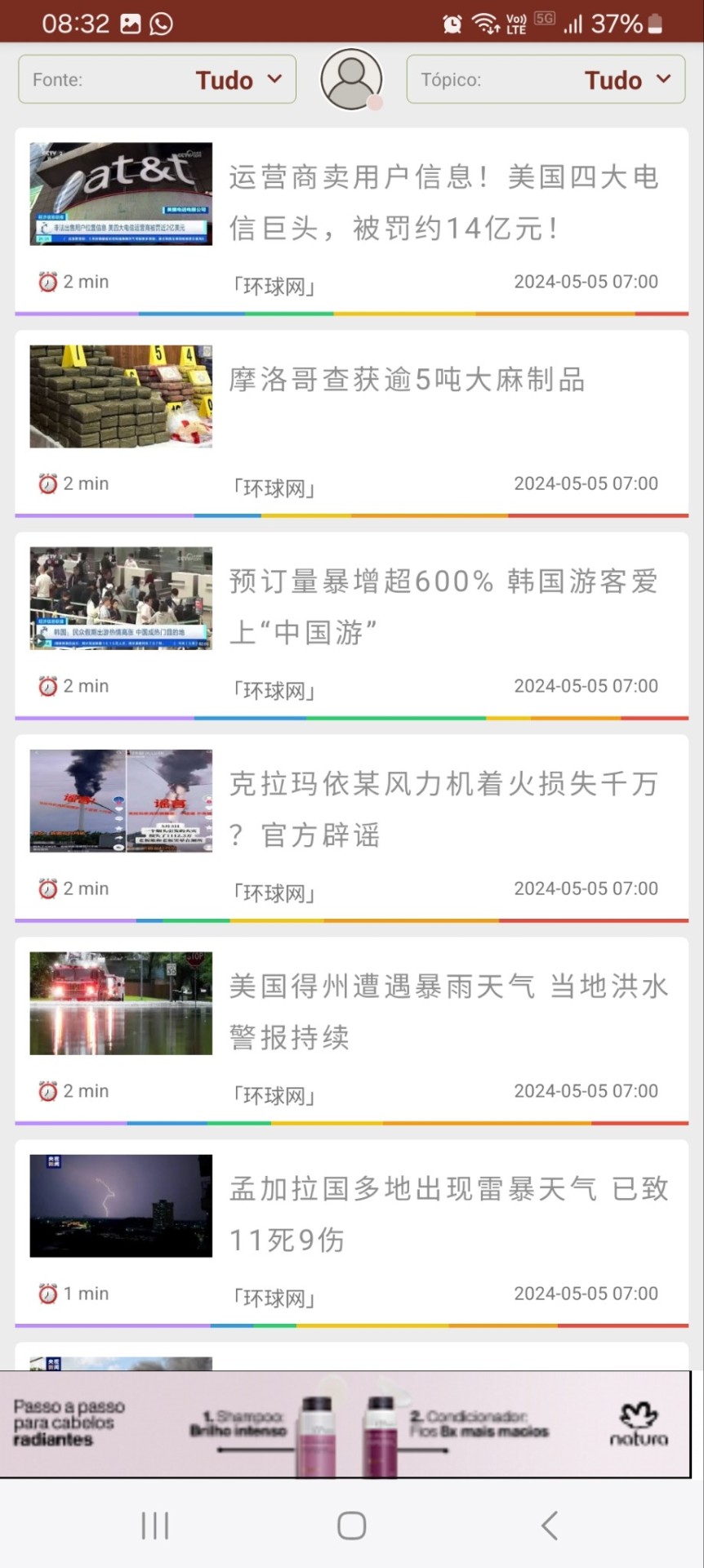
I also use YouTube and Spotify a lot.
#personal#resources#langblr#language learning#learning chinese#chinese langblr#chinese language#mandarin#中文
599 notes
·
View notes
Text
Courses for learning Thai language

Thailand Foundation and Chulalongkorn university have many self paced courses (mooc) for learning Thai language. It’s translated into many languages (as you can see). You can check them out here
Just found out this and wanted to share :)
#langblr#language learning#languages#love languages#thai langblog#thai langblr#thai language#Thailand#langblog#languages study#studying languages#studyblr#language resources
206 notes
·
View notes